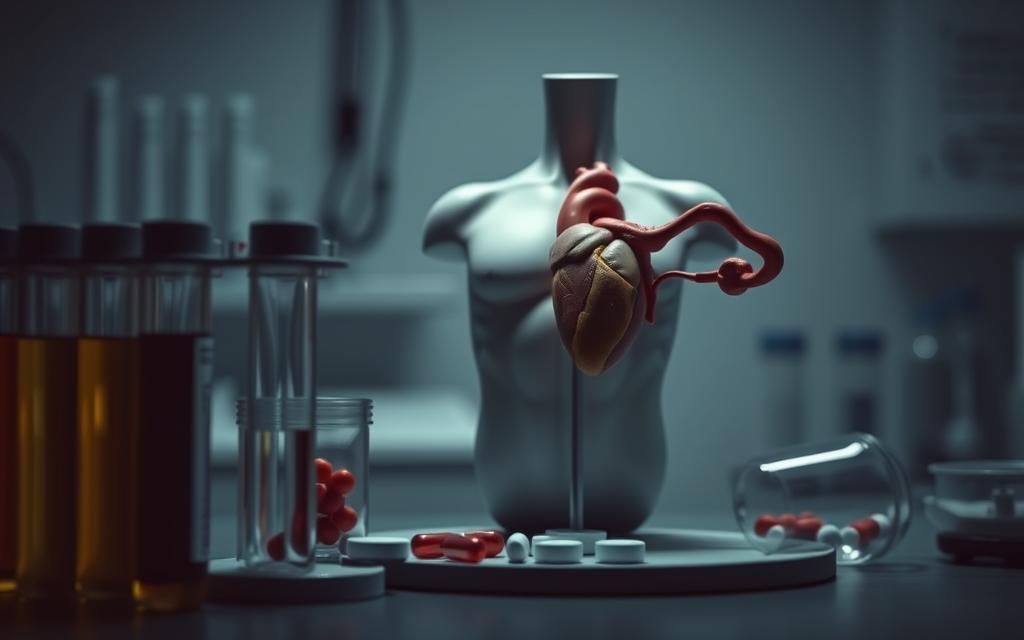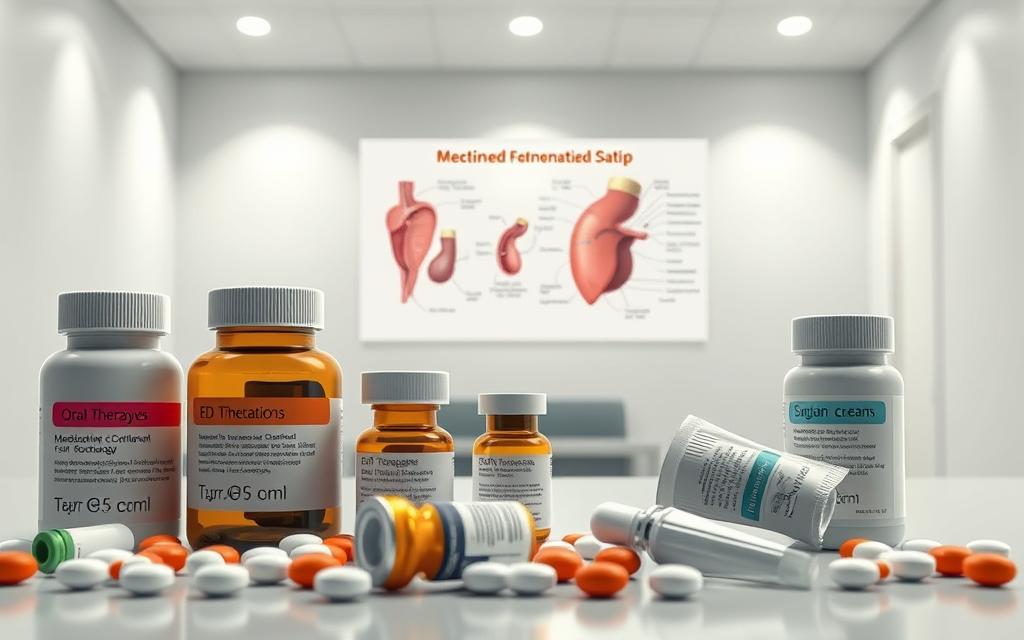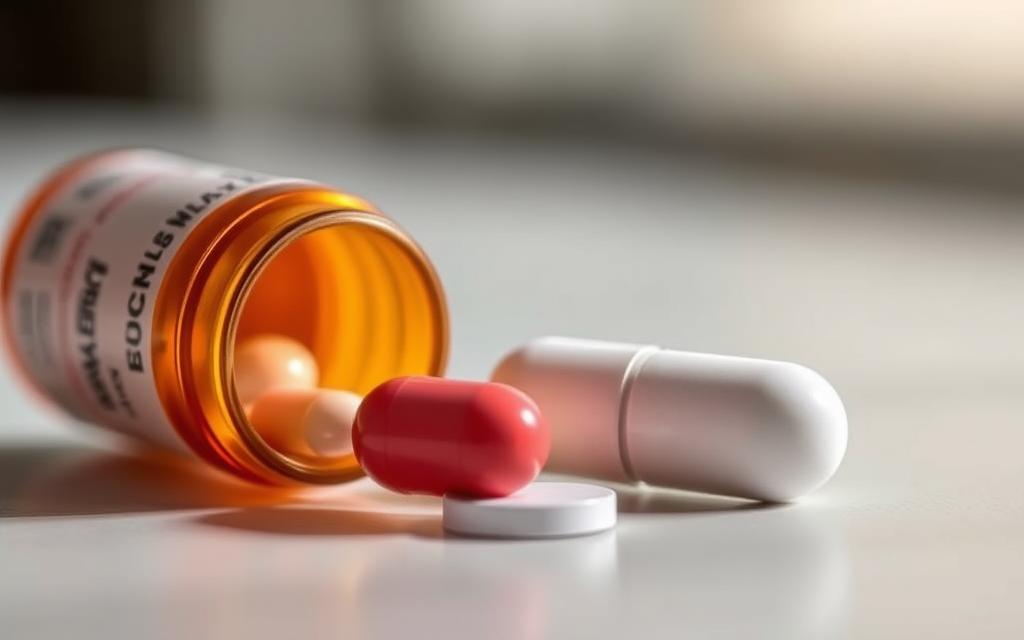Do Statins Cause Erectile Dysfunction? | Facts & Research
Millions of people worldwide take statins to manage their cholesterol levels. While these medications are generally safe, some users have reported experiencing erectile dysfunction (ED). The potential link between statins and ED has sparked intense debate.
This article aims to explore the relationship between cholesterol medication and erectile dysfunction, examining the available research and facts to provide a comprehensive understanding of the issue.
By delving into the latest studies and expert opinions, we will uncover whether there’s a significant connection between statins and ED, helping you make informed decisions about your health.
Understanding Statins and Their Purpose
To comprehend the potential link between statins and erectile dysfunction, it’s essential to first understand what statins are and their role in cardiovascular health. Statins are a group of medicines that are widely prescribed to help lower cholesterol levels in the blood, thereby reducing the risk of cardiovascular disease.
What Are Statins?
Statins, also known as HMG-CoA reductase inhibitors, are a class of lipid-lowering medications. They are designed to reduce the production of cholesterol in the liver, which in turn lowers the overall cholesterol levels in the blood.
How Statins Work in the Body
Statins work by inhibiting the enzyme HMG-CoA reductase, which plays a crucial role in the production of cholesterol in the liver. By reducing cholesterol production, statins help to lower low-density lipoprotein (LDL) cholesterol, often referred to as “bad” cholesterol, and can also modestly increase high-density lipoprotein (HDL) or “good” cholesterol.
Common Types of Statins Prescribed
Several types of statins are commonly prescribed, including atorvastatin (Lipitor), simvastatin (Zocor), rosuvastatin (Crestor), and pravastatin (Pravachol). Each has its own potency and potential side effects.
| Statin Type | Brand Name | Primary Use |
|---|---|---|
| Atorvastatin | Lipitor | Lowering LDL cholesterol |
| Simvastatin | Zocor | Reducing cardiovascular risk |
| Rosuvastatin | Crestor | Lowering LDL, raising HDL |
Erectile Dysfunction: Causes and Risk Factors
Erectile dysfunction (ED) is a condition that affects a significant number of men, impacting their sexual health and overall well-being. To understand ED, it’s essential to explore its definition, common causes, and risk factors that contribute to its development.
Defining Erectile Dysfunction
Erectile dysfunction is characterized by the inability to achieve or maintain an erection sufficient for satisfactory sexual performance. It’s a condition that can stem from a variety of factors, including physical, psychological, and lifestyle-related issues.
Common Causes of ED
Common causes of ED include cardiovascular disease, diabetes, obesity, and certain medications. Psychological factors such as stress, anxiety, and depression also play a significant role.
Risk Factors That Increase ED Likelihood
Several risk factors increase the likelihood of developing ED, including age, smoking, excessive alcohol consumption, and a sedentary lifestyle. Understanding these risk factors is crucial for prevention and management.
| Risk Factor | Description | Impact on ED |
|---|---|---|
| Age | Increasing age | Higher risk of ED |
| Smoking | Damages blood vessels | Increases ED risk |
| Obesity | Linked to various health issues | Contributes to ED development |
Do Statins Cause Erectile Dysfunction?
Statins, widely prescribed for lowering cholesterol, have been scrutinized for their potential impact on erectile function. The concern stems from reports of erectile dysfunction (ED) in men taking statins, prompting an examination of the possible mechanisms behind this association.
Theoretical Mechanisms Linking Statins and ED
The link between statins and erectile dysfunction is not straightforward. Several theoretical mechanisms have been proposed to explain how statins might influence erectile function. These include effects on testosterone production and the nitric oxide pathway, both crucial for normal erectile function.
Testosterone Production and Statins
Testosterone plays a vital role in male sexual health, including libido and erectile function. Some research suggests that statins may affect testosterone levels, although findings are inconsistent. The potential impact of statins on testosterone production is an area of ongoing research.
Nitric Oxide Pathway Effects
The nitric oxide (NO) pathway is essential for achieving and maintaining an erection. Statins may influence this pathway, potentially improving erectile function by enhancing endothelial function. However, the overall effect of statins on the NO pathway and its implications for ED remains complex and requires further investigation.

The relationship between statins and erectile dysfunction is multifaceted, involving various physiological pathways. Understanding these mechanisms is crucial for assessing the potential risks and benefits of statin therapy in men with concerns about erectile function.
What Scientific Research Shows
Scientific research into the connection between statin use and erectile dysfunction has produced a complex picture. To understand this relationship, it’s essential to examine the findings of major clinical studies, meta-analyses, and the limitations of current research.
Major Clinical Studies on Statins and ED
Several significant clinical studies have investigated the potential link between statins and erectile dysfunction. For instance, a study published in the Journal of the American College of Cardiology found that statin therapy was associated with improved erectile function in men with cardiovascular risk factors. Conversely, another study in the Journal of Clinical Pharmacology reported that statin use was linked to an increased risk of erectile dysfunction.
Meta-Analyses and Their Conclusions
Meta-analyses have attempted to synthesize the findings from various studies to draw more definitive conclusions. A meta-analysis published in the Journal of Sexual Medicine concluded that statin therapy did not significantly impact erectile function. However, another meta-analysis in Atherosclerosis suggested that statins might have a beneficial effect on erectile dysfunction, particularly in patients with cardiovascular disease.
Limitations of Current Research
Despite the wealth of research, there are several limitations to the current evidence. Many studies have methodological limitations, such as small sample sizes or short follow-up periods. Additionally, the heterogeneity in study populations and statin types used can make it challenging to draw firm conclusions. Further research is needed to fully understand the relationship between statins and erectile dysfunction.
By examining the existing research and its limitations, we can better understand the complex interplay between statins and erectile dysfunction.
Conflicting Evidence: When Statins May Improve Erectile Function
While the relationship between statins and erectile dysfunction (ED) is complex, some evidence suggests that statins may actually improve erectile function in certain cases. This seemingly contradictory effect can be attributed to the cardiovascular benefits of statins.
Cardiovascular Benefits That May Help ED
Statins are known to improve cardiovascular health by reducing cholesterol levels and preventing the formation of plaques in arteries. This improvement in cardiovascular health can enhance blood flow throughout the body, including to the penis, potentially leading to ED improvement. Better blood flow is crucial for achieving and maintaining an erection.
Studies Showing Positive Effects
Several studies have investigated the impact of statins on erectile function. A notable study published in the Journal of Sexual Medicine found that statin therapy was associated with improved erectile function in men with hyperlipidemia. Another study highlighted that the benefits of statins on erectile function might be more pronounced in individuals with cardiovascular risk factors.
The Endothelial Function Connection
The endothelial function plays a critical role in erectile health. Statins have been shown to improve endothelial function by promoting the production of nitric oxide, a key molecule involved in the relaxation of blood vessels. This improvement in endothelial function can contribute to better erectile health.
| Study | Population | Outcome |
|---|---|---|
| Journal of Sexual Medicine | Men with hyperlipidemia | Improved erectile function |
| European Journal of Cardiovascular Prevention & Rehabilitation | Men with cardiovascular risk factors | Enhanced erectile function with statin therapy |
These findings suggest that while statins may cause erectile dysfunction in some cases, they may also contribute to ED improvement in others, particularly through their benefits on cardiovascular and endothelial health.
Side Effects of Statins That May Contribute to ED
While statins are generally well-tolerated, some individuals may experience side effects that could potentially impact erectile function. Understanding these side effects is crucial for men who are concerned about maintaining their sexual health while managing their cholesterol levels.
Muscle Pain and Fatigue
One of the most commonly reported side effects of statins is muscle pain, known as myalgia, and fatigue. These symptoms can significantly impact a person’s quality of life and may indirectly affect erectile function. Research has shown that muscle pain and fatigue can lead to decreased physical activity and overall well-being, potentially contributing to erectile dysfunction.
Hormonal Changes
Statins may also influence hormonal balances in the body. Some studies suggest that statins can affect testosterone levels, although the evidence is not conclusive. Testosterone plays a crucial role in male sexual health, and any alterations in its production could potentially impact erectile function.
Psychological Effects of Medication
The psychological impact of taking statins should not be overlooked. Anxiety or depression related to the need for long-term medication can affect sexual performance. It’s essential to consider the mental health aspects when evaluating the potential link between statins and erectile dysfunction.
| Side Effect | Potential Impact on ED |
|---|---|
| Muscle Pain and Fatigue | Decreased physical activity and overall well-being |
| Hormonal Changes | Potential effects on testosterone levels |
| Psychological Effects | Anxiety or depression affecting sexual performance |
Alternative Explanations for ED in Statin Users
It’s crucial to consider alternative explanations when assessing ED in individuals taking statins. While statins are a common treatment for high cholesterol, erectile dysfunction can stem from a variety of causes unrelated to the medication itself.
Underlying Health Conditions
Many men who take statins have underlying health conditions that can contribute to ED, such as diabetes, hypertension, or cardiovascular disease. These conditions can damage blood vessels and restrict blood flow, making it difficult to achieve an erection.
Other Medications and Interactions
Statin users often take other medications that can cause ED or interact with statins in ways that exacerbate the condition. For example, certain antidepressants and blood pressure medications are known to have ED as a potential side effect.
Lifestyle Factors
Lifestyle choices, including smoking, excessive alcohol consumption, and lack of physical activity, can also contribute to ED. These factors can compromise cardiovascular health, further increasing the risk of erectile dysfunction.
Understanding these alternative explanations can help individuals and healthcare providers address ED more effectively, rather than attributing the condition solely to statin use.
Managing ED Concerns While Taking Statins
Addressing erectile dysfunction while on statin therapy involves discussing concerns with healthcare providers and potentially adjusting treatment plans. Men experiencing ED while taking statins should first consult their doctor to explore the best course of action.
Discussing Concerns With Your Doctor
It’s crucial to have an open conversation with your healthcare provider about ED symptoms. This discussion can help identify potential underlying causes and determine the most appropriate response. Be prepared to discuss your medical history, current medications, and lifestyle habits to help your doctor make an informed decision.
Potential Medication Adjustments
In some cases, adjusting the statin dosage or switching to a different statin may alleviate ED symptoms. Your doctor may also consider alternative cholesterol-lowering medications if necessary. It’s essential to follow your doctor’s guidance when making any changes to your medication regimen.
Lifestyle Modifications That May Help
Making healthy lifestyle changes can also help manage ED. This includes regular exercise, a balanced diet, stress management, and quitting smoking. These modifications not only support overall cardiovascular health but may also improve erectile function.
| Lifestyle Change | Potential Benefit |
|---|---|
| Regular Exercise | Improves cardiovascular health and erectile function |
| Balanced Diet | Supports overall health and may enhance ED treatment |
| Stress Management | Reduces stress, which can contribute to ED |
| Quitting Smoking | Improves cardiovascular health and reduces ED risk |
By working closely with your healthcare provider and making informed lifestyle choices, you can effectively manage ED concerns while taking statins.
Treatment Options for ED in Statin Users
Statin users experiencing erectile dysfunction have several treatment pathways to explore, each with its own set of considerations. The goal is to manage ED effectively while continuing to benefit from the cardiovascular protection offered by statins.
ED Medications and Their Compatibility With Statins
Phosphodiesterase type 5 inhibitors (PDE5 inhibitors), such as sildenafil (Viagra) and tadalafil (Cialis), are common treatments for ED. These medications are generally safe to use with statins, but it’s crucial to consult with a healthcare provider to discuss potential interactions and the appropriate dosage.
Key Considerations:
- Potential drug interactions: Statins and PDE5 inhibitors are both metabolized by the liver, which may increase the risk of side effects.
- Dosage adjustments: Healthcare providers may recommend starting with a lower dose of ED medication to minimize risks.
Non-Pharmaceutical Approaches
In addition to medication, several non-pharmaceutical approaches can help manage ED. These include lifestyle modifications and alternative therapies.
Lifestyle Changes:
- Increasing physical activity and exercise
- Maintaining a healthy diet and weight
- Reducing stress through techniques like meditation or yoga
When to Consider Alternative Cholesterol Treatments
In some cases, individuals may need to consider alternative treatments for high cholesterol, especially if ED persists or if there are significant concerns about statin side effects.

The following table summarizes key treatment options for ED in statin users:
| Treatment Approach | Description | Considerations |
|---|---|---|
| ED Medications | PDE5 inhibitors like sildenafil and tadalafil | Potential drug interactions, dosage adjustments |
| Lifestyle Modifications | Diet, exercise, stress reduction | Long-term commitment, potential for significant benefits |
| Alternative Cholesterol Treatments | Non-statin medications or lifestyle changes to manage cholesterol | May be considered if ED persists or if there are significant statin side effects |
Weighing the Benefits and Risks
Statins offer significant cardiovascular protection, but their use requires careful consideration of potential risks, including erectile dysfunction. When evaluating statins, it’s essential to balance their benefits against their possible side effects.
Cardiovascular Protection vs. Quality of Life
The primary benefit of statins is their ability to reduce the risk of cardiovascular events such as heart attacks and strokes. However, for some patients, the potential impact on quality of life, particularly regarding erectile dysfunction, is a significant concern.
- Cardiovascular benefits include reduced risk of heart attacks and strokes.
- Potential risks may involve erectile dysfunction and other side effects.
Individualized Decision-Making
Individualized decision-making is crucial when prescribing statins. Healthcare providers must consider a patient’s overall health, medical history, and personal preferences when determining the best course of treatment.
- Assess the patient’s cardiovascular risk factors.
- Evaluate the patient’s medical history for potential contraindications.
- Discuss treatment options and potential side effects with the patient.
The Importance of Open Communication With Healthcare Providers
Open communication between patients and healthcare providers is vital for managing the potential risks and benefits of statins. Patients should be encouraged to report any side effects, including changes in erectile function, to their healthcare provider.
By maintaining open lines of communication and considering individual patient needs, healthcare providers can help patients make informed decisions about their treatment.
Conclusion
The relationship between statins and erectile dysfunction (ED) is complex and has been the subject of extensive research. While some studies suggest that statins may contribute to ED, others indicate that these medications may actually improve erectile function by addressing underlying cardiovascular issues.
Key findings suggest that statins can have both positive and negative effects on erectile function. On one hand, statins can improve cardiovascular health, which is closely linked to erectile function. On the other hand, some statins may interfere with testosterone production or the nitric oxide pathway, potentially contributing to ED.
Ultimately, the decision to take statins should be based on individual health needs and a thorough discussion with a healthcare provider. By weighing the benefits of cardiovascular protection against potential effects on erectile function, individuals can make informed decisions about their treatment.
